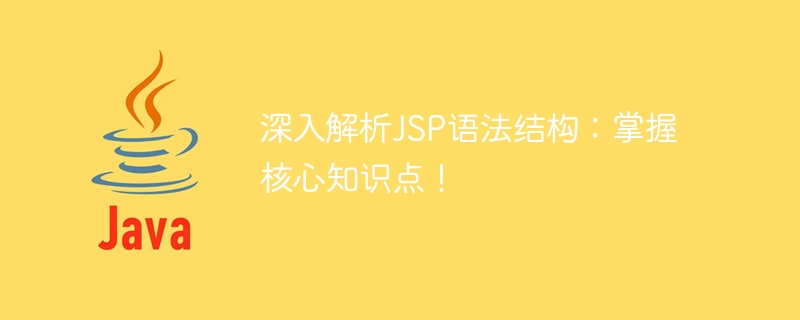

JSP (JavaServer Pages) is a server-side scripting language used to create dynamic web pages. The JSP syntax structure is simple and easy to learn, but it is powerful and can meet various complex web development needs.
A JSP page usually consists of the following parts:
Directives: Directives Used to tell the JSP container how to process the page. Common instructions are:
Script Elements: Script elements are used to embed Java code in JSP pages. Common script elements are:
<script></script>: used to write Java code blocks. JSP Tags: JSP tags are used to insert dynamic content into JSP pages. Common JSP tags are:
<if></if>: used to determine whether the condition is true. <foreach></foreach>: used to traverse the collection. <out></out>: used to output content. JSP instructions are used to tell the JSP container how to process the page. Common JSP instructions are:
<%@ page language="java" contentType="text/html; charset=UTF-8"
pageEncoding="UTF-8"%><%@ include %>: Used to include another JSP page. <%@ include file="header.jsp" %>
<%@ taglib %>: used to import JSP tag library. <%@ taglib prefix="c" uri="http://java.sun.com/jsp/jstl/core" %>
JSP script element is used to embed Java code in JSP pages. Common JSP script elements are:
<script>: used to write Java code blocks. <script>
int sum = 1 + 2;
out.println("The sum is: " + sum);
</script><% %>: Used to write Java expressions. <%
int sum = 1 + 2;
%><%= %>: Used to output the results of Java expressions. <%= 1 + 2 %>
JSP tag is used to insert dynamic content in JSP pages. Common JSP tags are:
<c:if>: used to determine whether the condition is true. <c:if test="${user != null}">
Welcome, ${user.name}!
</c:if><c:forEach>: Used to traverse the collection. <c:forEach var="item" items="${items}">
<li>${item}</li>
</c:forEach><c:out>: Used to output content. <c:out value="${user.name}" />HTML code is used to create static content in JSP pages.
<!DOCTYPE html>
<html>
<head>
<title>My JSP Page</title>
</head>
<body>
<h1>Hello, world!</h1>
</body>
</html>The following is a simple JSP code example:
<%@ page language="java" contentType="text/html; charset=UTF-8"
pageEncoding="UTF-8"%>
My JSP Page
Hello, world!
<%
int sum = 1 + 2;
out.println("The sum is: " + sum);
%>
This JSP code example will output the following:
<!DOCTYPE html>
<html>
<head>
<title>My JSP Page</title>
</head>
<body>
<h1>Hello, world!</h1>
The sum is: 3
</body>
</html>The above is the detailed content of In-depth understanding of the core knowledge points of JSP syntax structure. For more information, please follow other related articles on the PHP Chinese website!
 vcruntime140.dll cannot be found and code execution cannot continue
vcruntime140.dll cannot be found and code execution cannot continue
 pr shortcut key
pr shortcut key
 How to dress up Douyin Xiaohuoren
How to dress up Douyin Xiaohuoren
 What does data intelligence mean?
What does data intelligence mean?
 parentnode usage
parentnode usage
 How to read data from excel file in python
How to read data from excel file in python
 What to do if the computer fakes death
What to do if the computer fakes death
 What to do if css cannot be loaded
What to do if css cannot be loaded
 What is the difference between JD International self-operated and JD self-operated
What is the difference between JD International self-operated and JD self-operated




